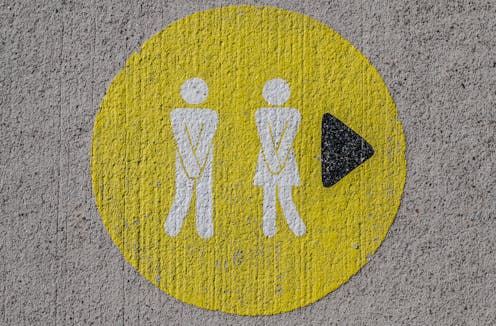Why do I need to pee more in the cold?
- Written by Christian Moro, Associate Professor of Science & Medicine, Bond University

You’re taking a stroll through the park on a cold winter’s morning, when it hits you – the need to find a bathroom, and quick! This didn’t used to happen in summer.
Is there something about winter that makes us need to pee more?
We study the bladder and lower urinary tract. Here are two main explanations for what’s going on.
Read more: Why are my hands and feet always cold? And when should I be worried?[1]
1. Our lifestyle changes
In summer, we tend to be outside and more active. We sweat more (to lose heat) and it’s easy to become dehydrated if we don’t drink enough water.
This impacts the amount of free fluid our body is willing to excrete[2], and our urine volume is often reduced because of this.
In winter, we’re often indoors, around water sources, so we are more likely to be hydrated, less active, and to sweat less. As such, we tend to have more free fluid to excrete via our urine.
Read more: Curious Kids: if our bodies are happy at 37℃, why do we feel so unhappy when it's too hot outside?[3]
2. Our body wants to avoid losing too much heat
If we become cold very quickly, the body protects our internal organs in a number of ways.
One is “cold-induced diuresis[4]”, or an increase in urine excretion in response to the cold[5].
Initially, blood is diverted away from the skin to avoid losing its heat to the outside air. This means more blood ends up flushing through your internal organs.
In particular, blood rushes to your kidneys in a greater volume and at a higher pressure. This increases the amount the kidneys need to filter[6]. As a result, your rate of urine excretion[7] increases.
Read more: Why is it so cold right now? And how long will it last? A climate scientist explains[8]
What should I do?
Our diet, age, blood pressure, and personal situation can all impact how much we urinate.
Could you have a small bladder? Or an overactive bladder?Producing more urine can also be a sign of hypothermia[9]. This is your body responding to the cold as a stressor, so act quickly. Find somewhere away from the cold, and slowly warm up your body.
If the increased urine is also accompanied by other symptoms[10], such as extensive shivering, breathing difficulties, or confusion, seek medical attention immediately.
Read more: Health Check: why do some people feel the cold more than others?[11]
Keep up the fluids in winter too
If you’re out in the cold, you may not feel thirsty. Nonetheless, be sure to drink plenty of fluids during the day. Although it may be tempting to avoid drinking so you don’t need to keep rushing to the bathroom, this can lead to dehydration.
If you’re often out in the cold in light gear, and you find this increases your urinary output, there can be impacts over the long term.
Frequent urination can be detrimental[13] to your body’s natural salt balance (particularly sodium and potassium[14]). So be sure to maintain a healthy diet.
It does seem like a bit of a balancing game. The key, however, is to avoid stressing your body this way when it’s cold. To do this, be sure to dress appropriately and keep warm.
Read more: Forget heatwaves, our cold houses are much more likely to kill us[15]
What if you don’t notice a difference?
Although the body has mechanisms to make you urinate more[16] in the cold, not everyone notices peeing more in winter.
If you keep warm, there’s no reason to think your body would often be “shocked” into responding to cold temperatures.
In fact, when tracked in research studies, it has been common for researchers to record no difference in urinary[17] output[18] between the seasons[19].
What about the urine?
It’s not just the volume of urine that might be different in winter. The composition can change too.
The body excretes a higher amount of calcium[20] in the urine during winter[21].
This is more likely due to lifestyle during cold seasons rather than anything internal. We tend to be less active[22] in winter, gain extra weight[23], and eat more salty, preserved and processed foods.
This means there can be a higher risk of developing kidney stones[24] during winter for people who are susceptible.
So as the weather cools down, be sure to maintain a healthy lifestyle, stay warm, and don’t forget to stay hydrated, even when it’s cold.
Read more: Curious Kids: why is urine yellow?[25]
References
- ^ Why are my hands and feet always cold? And when should I be worried? (theconversation.com)
- ^ excrete (www.nature.com)
- ^ Curious Kids: if our bodies are happy at 37℃, why do we feel so unhappy when it's too hot outside? (theconversation.com)
- ^ cold-induced diuresis (pubmed.ncbi.nlm.nih.gov)
- ^ cold (journals.physiology.org)
- ^ filter (journals.physiology.org)
- ^ urine excretion (www.frontiersin.org)
- ^ Why is it so cold right now? And how long will it last? A climate scientist explains (theconversation.com)
- ^ hypothermia (onlinelibrary.wiley.com)
- ^ other symptoms (www.healthdirect.gov.au)
- ^ Health Check: why do some people feel the cold more than others? (theconversation.com)
- ^ Shutterstock (www.shutterstock.com)
- ^ detrimental (www.sciencedirect.com)
- ^ potassium (www.mayoclinic.org)
- ^ Forget heatwaves, our cold houses are much more likely to kill us (theconversation.com)
- ^ urinate more (pubmed.ncbi.nlm.nih.gov)
- ^ urinary (pubmed.ncbi.nlm.nih.gov)
- ^ output (pubmed.ncbi.nlm.nih.gov)
- ^ seasons (pubmed.ncbi.nlm.nih.gov)
- ^ calcium (pubmed.ncbi.nlm.nih.gov)
- ^ winter (pubmed.ncbi.nlm.nih.gov)
- ^ less active (www.ncbi.nlm.nih.gov)
- ^ extra weight (pubmed.ncbi.nlm.nih.gov)
- ^ kidney stones (www.ncbi.nlm.nih.gov)
- ^ Curious Kids: why is urine yellow? (theconversation.com)
Read more https://theconversation.com/why-do-i-need-to-pee-more-in-the-cold-184236
















